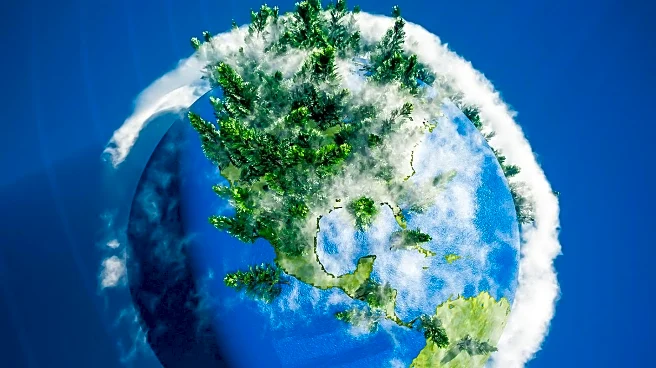What is the story about?
What's Happening?
Razan Al Mubarak, president of the International Union for Conservation of Nature, has highlighted the critical role of biodiversity as Earth's original information network. In a commentary, Al Mubarak argues that biodiversity is not merely a collection of species but a vast archive of evolutionary knowledge encoded in DNA. This biological data system has been refined over millions of years, storing solutions to survival challenges. The extinction of species is likened to the loss of irreplaceable data, erasing knowledge that evolution has compiled over eons. Al Mubarak emphasizes that protecting biodiversity is crucial for maintaining the planet's distributed intelligence, which supports agriculture, medicine, and climate stability.
Why It's Important?
The significance of biodiversity extends beyond ecological beauty; it is integral to human security and innovation. The loss of species represents a breach in the global data system, compromising ecosystems and potential future discoveries. Biodiversity has inspired numerous scientific advancements, such as flight, sonar, and adhesives. A notable example is the Gila monster's venom, which led to the development of GLP-1 drugs for diabetes and weight loss. These drugs trace their lineage to a molecule evolved in the Gila monster, showcasing how nature's code can lead to pharmaceutical breakthroughs. Preserving biodiversity is essential for safeguarding the planet's intelligence and ensuring the continuity of life-sustaining solutions.
What's Next?
The upcoming IUCN World Conservation Congress in Abu Dhabi will focus on protecting wildlife and ensuring the continuity of Earth's intelligence. Institutions and governments play a critical role in maintaining biodiversity, but preservation efforts must extend beyond policy. Individuals can contribute by observing wildlife, participating in citizen-science databases, reducing consumption that drives habitat loss, and supporting organizations that defend ecosystems. These actions help sustain the flow of information between species and environments, which is vital for collective resilience.
Beyond the Headlines
The extinction crisis is fundamentally an information crisis, as humanity loses access to nature's libraries before fully understanding their contents. Biodiversity offers a decentralized repository of survival strategies that no human technology can replicate. Preserving this system is not only an ethical duty but an existential necessity. The analogy of biodiversity as a living knowledge system underscores the importance of strategic conservation efforts to protect the planet's intelligence.















